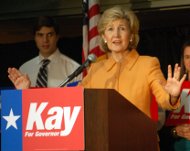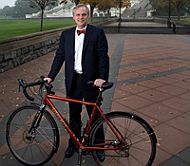By Terri Hall
Express-News / Houston Examiner
October 6, 2009
If you believe Rick Perry, today he’s finally conceded the death of the initial Trans Texas Corridor foreign-owned toll road, land-grabbing superhighway that would have paralleled I-35, called TTC-35. However, there’s LOTS more to this story.
Perry would have us believe the announcement was because of the lack of political support, but since when does he care a flip about whether his toll road policies have political support? Look no further than his veto of eminent domain reform legislation, HB 2006, and the private toll moratorium bill, HB 1892, passed by a supermajority of the Texas Legislature in 2007 for proof.
There’s never been grassroots support for his hefty toll tax increases nor the Trans Texas Corridor. The REAL reason Perry’s highway department, the Texas Department of Transportation (TXDOT), put the nail in the coffin of TTC-35 was because it was under the threat of a federal lawsuit by a local government commission, the Eastern Central Texas Sub-Regional Planning Commission, which was formed to stop TTC-35 dead in its tracks.
There’s nothing that puts more fear in a politician up for re-election than a messy, well-publicized federal lawsuit against one of his most controversial, polarizing policies. So rather than risk certain death at the polls, Perry opted for the death of his beloved special interest TTC-35. Of course, the Texas Farm Bureau’s endorsement of Senator Kay Bailey Hutchison for governor played a role in the timing of the announcement.
Hutchison said in a statement today: “The Trans-Texas Corridor will not be officially dead until Rick Perry is no longer governor and his political appointees are no longer running TxDOT. Texans can’t trust Rick Perry when it comes to protecting their land from the government, ceasing to lease our highways to foreign companies or ending the Trans-Texas Corridor.”
I couldn’t agree more.
Trans Texas Corridor #2 still alive & well
To demonstrate the point that Texas isn’t safe from Perry’s policies until he’s kicked out of office, the Trans Texas Corridor plan #2, known as TTC-69/I-69 in the hands of Spanish company ACS, is still on the table.
“Officials said that project (69), which unlike the I-35 plan would mainly involve expanding existing highways, remains alive,” according to the Austin American Statesman on October 6, 2009.
When over 28,000 Texans went on the record AGAINST TTC-69, it goes to show Perry’s same ol’ stubborn indifference to the people of Texas in regards to the Trans Texas Corridor.
He throws the public a bone over here (saying the “TTC-35 is dead”) in order to distract from an equally controversial debacle over there (TTC-69) that threatens to damage the environment, private property rights, and the economic prosperity of thousands of Texans.
Bottom line: Texans can’t trust Rick Perry to keep his word or to truly KILL his destructive, detested toll road agenda. The only sure way to keep Texas safe is to give Perry the boot!


 The US Senate on Thursday voted to renew a prohibition on the tolling of existing freeways in the state of Texas. The measure was adopted as part of a larger $123 billion transportation appropriations bill for fiscal year 2010, which passed the House in July.
The US Senate on Thursday voted to renew a prohibition on the tolling of existing freeways in the state of Texas. The measure was adopted as part of a larger $123 billion transportation appropriations bill for fiscal year 2010, which passed the House in July. A Member of Congress proposes to use taxpayer money to fund the development of technology to track motorists as part of a new form of taxation. US Representative Earl Blumenauer (D-Oregon) introduced H.R. 3311 earlier this year to appropriate $154,500,000 for research and study into the transition to a per-mile vehicle tax system.
A Member of Congress proposes to use taxpayer money to fund the development of technology to track motorists as part of a new form of taxation. US Representative Earl Blumenauer (D-Oregon) introduced H.R. 3311 earlier this year to appropriate $154,500,000 for research and study into the transition to a per-mile vehicle tax system.